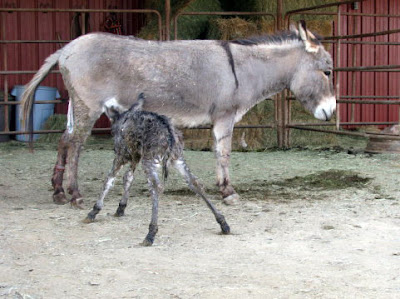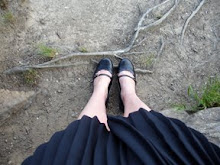
A friend of mine from way back, lives in Colorado and owns a ranch where she raises horses and donkeys. Being a city girl, I know nothing about such matters so I was excited to get a recent email from her documenting the birth of a new donkey named Franklin. Apparently Jaime had gone out to feed the animals right as this birth was happening, so she was there to witness and assist. She had to do a "umbilical dip" which entails putting iodine on the cord or else it will become infected and the animal will die. All of this is pretty interesting I think, as I've never witnessed a birth of any kind. I asked her to explain the process to me, so here is the story in her own words:
donkeys are unlike horses in that they are a more "wild-type". Basically, that means they will not physically show pain until the end is near. There are all manner of things that can go wrong with equines, but donkeys are more fit for survival in an un-domesticated environment (ie if they show pain, they are a target for predators). Horses have been so domesticated & selectively bred, that they are much more honest when it comes to showing pain.
When donkeys give birth they basically lie down, shoot the kid out & get it over-with as soon as possible. Again, it's the "wild-type", survival instinct sort of thing. Since the Jennet (mother) gets up right away (to protect the baby & save herself from potential predators smelling the grossness) the umbilical cord is broken. She still has the placenta inside her & will pass it as she is caring for the kid. Now, this is what's amazing. The kid was standing (wobbly) & the placenta was passed within 15 minutes. (I am assuming that's because the mother, Aimee, knew it was a safe environment.) I've heard stories about delayed birth that make me extremely nervous. So as soon as the kid gets up you have to be sure it nurses. The mothers milk has colostrum which contains antibodies & all manner of things that will help protect the baby & boost it's immune system.
The other thing I have to do which is a bit nasty, is check the placenta once it is passed. I have to make sure it is in one piece & has 2 horns & lalala.....If the placenta is retained, it can be managed in horses, but donkeys (especially Sicilians-what I have) are difficult, because they are so small. A retained placenta creates a toxic enviroment in the body which causes havoc systemically. It can cause inflammation in equines hooves resulting in a conditon called Founder. They can't stand or walk. It is horrifically painful. So you have to make sure of this nasty placenta business.
The iodine dip is necessary for domesticated animals. No matter how clean you keep a stall, run, or any kind of enclosure there will be bacteria. In the wild, the kid will have to be moving pretty quick & there will not be the concentration of urine, manure, or whatever else there is in the ground or bedding. So it should be safe from infection.





 A friend of mine from way back, lives in Colorado and owns a ranch where she raises horses and donkeys. Being a city girl, I know nothing about such matters so I was excited to get a recent email from her documenting the birth of a new donkey named Franklin. Apparently Jaime had gone out to feed the animals right as this birth was happening, so she was there to witness and assist. She had to do a "umbilical dip" which entails putting iodine on the cord or else it will become infected and the animal will die. All of this is pretty interesting I think, as I've never witnessed a birth of any kind. I asked her to explain the process to me, so here is the story in her own words:
A friend of mine from way back, lives in Colorado and owns a ranch where she raises horses and donkeys. Being a city girl, I know nothing about such matters so I was excited to get a recent email from her documenting the birth of a new donkey named Franklin. Apparently Jaime had gone out to feed the animals right as this birth was happening, so she was there to witness and assist. She had to do a "umbilical dip" which entails putting iodine on the cord or else it will become infected and the animal will die. All of this is pretty interesting I think, as I've never witnessed a birth of any kind. I asked her to explain the process to me, so here is the story in her own words:






No comments:
Post a Comment